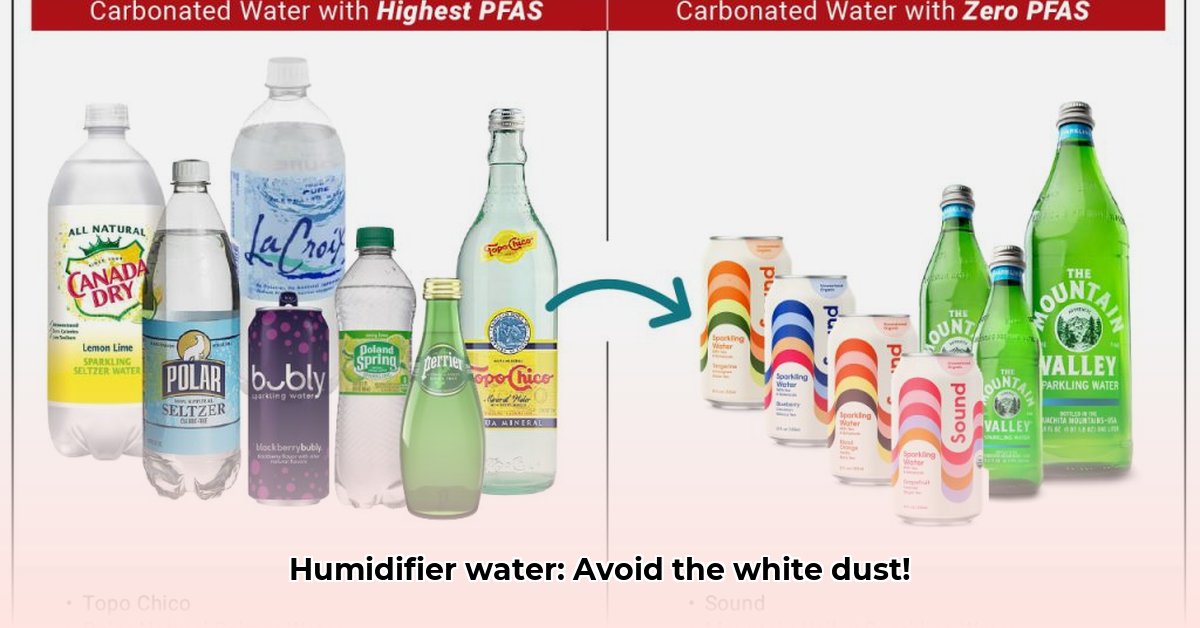Dealing with that annoying white dust from your humidifier? Picking the right water is key to a healthy, happy home—and it’s easier than you think! This guide breaks down the mystery of which water is best for your humidifier: tap water, distilled water, reverse osmosis (RO) water, and more. We’ll compare them head-to-head, give you simple tips to avoid problems, and show you how to keep your humidifier running smoothly for years. For a deeper dive into water types, check out this helpful article on [distilled vs. filtered water](https://turthledeep.com/is-distilled-water-the-same-as-filtered-water/). Let’s get your humidifier working perfectly so you can breathe easy!
Water for Humidifier: Keep Your Machine Happy and Your Air Clean
Let’s be honest: nobody wants a fine white dust coating everything in their home, courtesy of their humidifier. That’s why choosing the right kind of water is super important. It’s not just about avoiding a messy cleanup; it’s about keeping your humidifier running smoothly and breathing easier. Selecting the correct water ensures that you will extend the life of the humidifier.
Why Your Tap Water Might Be Trouble
Tap water, while convenient, often has a lot of minerals dissolved in it. Think calcium and magnesium – they’re like tiny little construction workers, constantly building up inside your humidifier. This mineral buildup is like a slow, stubborn clog in your machine. It makes your humidifier work harder, which shortens its lifespan. These minerals can also turn into that annoying white dust, tiny particles floating around in the air you breathe.
Your Water Options: A Head-to-Head Comparison
So, what’s a humidifier owner to do? You need cleaner water to keep your machine happy and healthy. Here’s a closer look at some popular choices:
| Water Type | Mineral Buildup | Bacteria Risk | Efficiency | Cost | Best For |
|---|---|---|---|---|---|
| Tap Water | High | High | Low | Very Low | Short-term emergencies only |
| Boiled Tap Water | Medium | Medium | Low-Medium | Low | Short-term, but still carries some risk |
| Filtered Water | Medium | Medium | Low-Medium | Low-Medium | A bit better than tap, but not a perfect solution |
| Softened Water | Low-Medium | Low-Medium | Medium | Medium | A step up from plain tap water, but still has limitations |
| Reverse Osmosis (RO) Water | Low | Low | High | Medium-High | Best balance of cost and effectiveness for regular use |
| Distilled Water | Negligible | Negligible | High | High | The purest option. Ideal for sensitive individuals and maximum longevity |
While tap water is the cheapest option, it’s also the riskiest. The more minerals present, the more buildup you’ll get, and that means more dust and a shorter lifespan for your humidifier.
Choosing the Right Water: A Step-by-Step Guide
Follow these steps to pick the best water type for your humidifier:
- Test your tap water (if you aren’t sure how hard it is): Look up how hard your water is online, or use a simple home water hardness test kit. Really hard water? You probably want to consider an alternative.
- Consider your budget and how often you use your humidifier: Distilled water is the cleanest, but it also costs more. RO water is a great middle ground – good quality and more budget-friendly for daily use.
- Think about your health: If you have allergies, asthma, or other respiratory sensitivities, you might want to opt for distilled or RO water to minimize the chance of inhaling irritants. Remember, even tiny particles can make a big difference.
- Always check your humidifier’s manual: The manufacturer’s recommendations are key. They’ll tell you what’s best for your humidifier’s longevity.
- Think long-term: Investing in a home water filtration system (like a reverse osmosis system) is one of the best ideas for the long run. This is particularly true if you use your humidifier regularly. The savings from less frequent humidifier replacement, cleaner air, and a healthier machine will likely outweigh the initial cost over time.
More Than Just the Water: Humidifier Maintenance
Even with the purest water, keeping your humidifier clean is crucial. Regular cleaning prevents mold and mildew from growing inside and spreading into the air. Always follow the manufacturer’s instructions for cleaning your specific model. By following the manufacturer’s instructions, you avoid voiding the warranty.
Choosing the best water for your humidifier is a simple step that can make a huge difference in its lifespan, the quality of your air, and even your health. Don’t underestimate the importance of this seemingly small detail; a little attention goes a long way! There’s still ongoing research about the effects of different water types on humidifier performance; keeping up with the latest findings is a good idea!
Best Humidifier Water for Ultrasonic Models and Preventing White Dust
Key Takeaways:
- Using tap water in ultrasonic humidifiers often leads to white dust, a mineral deposit.
- Best humidifier water for ultrasonic models is distilled water. It minimizes mineral buildup and prevents white dust.
- Regular cleaning is crucial, regardless of the water type used.
- Consider alternative humidifier types (evaporative) for less white dust.
- Water hardness significantly impacts white dust formation.
Understanding the White Dust Problem
Have you ever noticed a fine white dust accumulating around your ultrasonic humidifier? That’s mineral buildup from your tap water. Ultrasonic humidifiers create a fine mist, atomizing the water. This process concentrates minerals, leading to the telltale white dust. It’s not just unsightly; it can affect your indoor air quality.
Choosing the Right Water: The Key to Clear Air
The simplest solution to prevent white dust is using the right water. What’s the best humidifier water for ultrasonic models? Distilled water is the clear winner; it lacks the minerals that cause the problem. Bottled spring water can be a decent alternative, but check its mineral content—lower is better. Also, make sure the spring water you purchase hasn’t expired.
Avoid tap water, especially if you have hard water. Hard water is loaded with minerals, significantly increasing white dust formation. Think of it like this: hard water is like a concentrated mineral soup; the humidifier turns it into a mist that coats your surfaces.
Beyond Water: Humidifier Selection and Maintenance
While choosing the right water is critical, selecting the right humidifier is also crucial. Evaporative humidifiers are less prone to creating white dust. They work by wicking water onto a filter, and evaporation disperses moisture.
Regular cleaning is vital, regardless of your water choice. Follow the manufacturer’s instructions meticulously. Cleaning schedules depend on the frequency of use and water hardness. A buildup of minerals and bacteria can worsen air quality.
A Practical Guide to White Dust Prevention
To prevent white dust accumulation, remember to:
- Choose the right water: Use distilled water or low-mineral spring water.
- Clean regularly: Follow your manufacturer’s instructions for cleaning.
- Consider alternative humidifiers: Explore evaporative models for reduced white dust.
- Monitor water hardness: If you have hard water, stricter cleaning is vital.
Comparing Water Types: A Quick Reference
| Water Type | Mineral Content | White Dust Risk | Cost |
|---|---|---|---|
| Distilled Water | Very Low | Very Low | Moderate |
| Spring Water | Low to Moderate | Low to Moderate | Moderate |
| Tap Water | Variable | High | Very Low |
Choosing the Right Humidifier Water for Specific Room Sizes and Climates
Key Takeaways:
- Mineral content in water significantly impacts humidifier performance and longevity.
- Distilled water is the best option for minimizing maintenance and maximizing lifespan.
- Reverse osmosis water offers a more affordable alternative.
- Tap water, while convenient, increases the risk of damage and white dust.
- Choosing the Right Humidifier Water for Specific Room Sizes and Climates requires considering both water type and humidifier capacity.
Understanding the Impact of Water Quality
Let’s face it: Nobody wants a dusty, gunky humidifier. The type of water you use directly affects your machine’s lifespan and the air quality in your home. Hard water, rich in minerals, creates white dust and scale buildup. This isn’t just unsightly; it clogs components, leading to premature failure, thus shortening the humidifier’s lifespan.
Comparing Water Types: A Quick Guide
This table summarizes the pros and cons of different water choices for your humidifier. Remember, your climate can also influence your choice. Dry climates might necessitate more frequent humidification, increasing water consumption and thus the overall cost.
| Water Type | Pros | Cons | Best For |
|---|---|---|---|
| Distilled Water | Cleanest, prevents mineral buildup, longest lifespan | Most expensive | All humidifiers, prioritizes longevity and clean air |
| Reverse Osmosis (RO) Water | Cleaner than tap water, cost-effective long-term |
- Windows App to Stop Apps Running in Background Saves Battery - February 2, 2026
- How To Spot Android Apps Running In The Background - February 1, 2026
- Android App to Stop Background Apps and Save Battery - January 31, 2026










